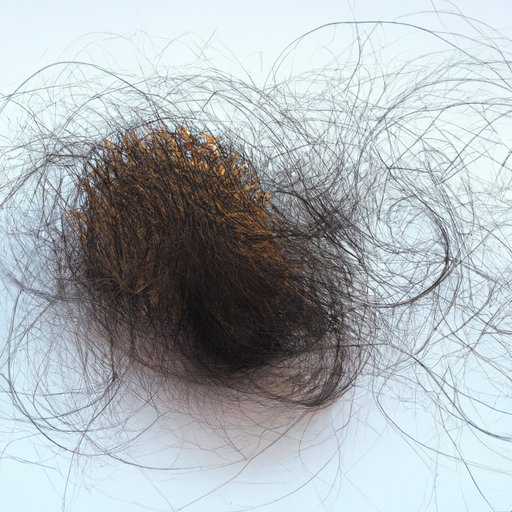
Can Stress Make Your Hair Fall Out?
If you’ve ever gone through a period of stress, you may have noticed a change in your hair health. Stress is a natural response to life events, but when it lasts for too long or becomes chronic, it can have various adverse effects on the body, including hair loss. But how exactly does this happen, and what can you do to prevent or manage stress-induced hair fall? In this article, we’ll explore the different aspects of stress and hair loss and provide actionable tips for maintaining healthy hair and a stress-free life.
Unraveling the Link Between Stress and Hair Loss
While it’s still unclear exactly how stress-induced hair loss occurs, scientists suggest that it may be partly related to the hair growth cycle. According to the American Academy of Dermatology, hair follicles go through three different stages: anagen (growth), catagen (transition), and telogen (resting). When the body undergoes stress, it can prematurely push hair follicles into the telogen phase, causing more hair to fall out than usual. Additionally, stress can also lead to inflammation and hormone imbalances, both of which can affect hair health and cause hair loss.
There are two types of stress-induced hair loss: telogen effluvium and alopecia areata. Telogen effluvium refers to the excessive shedding of hair due to the abrupt shift of hair follicles from the anagen to the telogen phase. Alopecia areata, on the other hand, is an autoimmune condition where the immune system attacks hair follicles, causing hair to fall out in patches. Both conditions can be triggered or exacerbated by stress.
Fortunately, there are ways to manage stress levels and reduce the risk of hair loss. Some tips include practicing relaxation techniques like yoga and meditation, getting enough sleep, engaging in physical activity, and seeking support from friends and family.
The Age-Old Question: Is Stress Really Causing Your Hair to Fall Out?
There is no doubt that stress can affect hair health and cause hair loss, but there are also many myths and misconceptions surrounding this topic. For instance, some people believe that wearing hats or using hair products can cause hair loss, while in reality, these factors have no significant impact on hair health.
According to Dr. Jerry Shapiro, a hair loss expert at NYU Langone Health, stress can indeed cause hair loss, but it’s not the only factor to consider. Other causes of hair loss include genetics, medication use, and certain medical conditions. Therefore, it’s essential to consult a hair specialist if you’re experiencing excessive or sudden hair loss to rule out other possible causes.
In terms of the relationship between stress and hair fall, it’s a bit more complicated than we may think. Some studies suggest that stress has a more significant impact on people who are prone to hair loss due to genetics or hormonal imbalances, while others indicate that stress can cause hair loss in otherwise healthy individuals.
From Hair Loss to Hair Growth: Our Journey of Dealing with Stress
My personal experience with stress-induced hair loss has taught me the importance of taking care of both my mental and physical health. I’ve always had thick and healthy hair, but during a period of extreme stress, I started noticing more hair falling out than usual. It was a distressing time for me, and I started researching and experimenting with different strategies to restore my hair health.
Through my journey, I learned that stress not only affects hair health but also overall wellness. High stress levels can lead to anxiety, depression, insomnia, and physical health issues. Thus, it’s important to prioritize self-care practices that help manage stress levels. Some of the strategies that helped me include practicing mindfulness, taking time to relax and unwind, eating a well-balanced diet, and getting regular exercise.
Stress, Hair Fall, and Beyond: An All-Encompassing Guide
If you’re experiencing hair loss or thinning due to stress, you’re not alone. In fact, stress-induced hair loss is a common condition, and there are many ways to manage it. Some of the symptoms to look out for include increased shedding of hair, thinning on the top of the scalp, and sudden hair loss in small patches. Understanding the cause and triggers of stress-induced hair fall is essential in finding the right treatment.
As mentioned earlier, stress can cause hair loss through different mechanisms, including hormonal imbalances, inflammation, and premature follicle cycling. Managing stress levels is crucial in preventing or managing hair loss. Some effective treatment options include hair regrowth medication, hair transplant surgery, and lifestyle changes like reducing stress levels, practicing good hair care habits, and adopting healthy habits that promote hair growth.
Preventing and Managing Hair Loss Caused by Stress: Tried and Tested Tips
Some simple yet effective tips for preventing or managing stress-induced hair loss include keeping a stress journal, practicing mindfulness, adopting a balanced diet rich in hair-healthy nutrients, such as biotin, iron, and vitamin C, and trying natural remedies like scalp massages and aromatherapy. It’s also important to maintain a healthy lifestyle by avoiding smoking, excess alcohol consumption, and maintaining a healthy weight.
Conclusion
Stress-induced hair loss can be a challenging condition to deal with, but with the right approach, it’s possible to regain healthy hair and manage stress levels. In this article, we’ve covered the scientific basis for stress-induced hair loss, debunked myths and misconceptions, shared personal stories and expert insights, and provided actionable tips for preventing and managing hair loss caused by stress. Remember to prioritize self-care practices, seek support when you need it, and consult a hair specialist if you’re experiencing concerning hair loss. With the right mindset and lifestyle changes, you can overcome stress-induced hair loss and achieve optimal hair and overall health.





